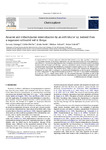Atrazine and terbuthylazine mineralization by an Arthrobacter sp. isolated from a sugarcane-cultivated soil in Kenya

View/
Date
2009Author
Getenga, Zachary
Dörfler, Ulrike
Iwobi, Azuka
Schmid, Michael
Schroll, Reiner
Metadata
Show full item recordAbstract
A tropical soil from a Kenyan sugarcane-cultivated field showed a very high capability to mineralize 14C-ring-labeled atrazine. In laboratory experiments this soil mineralized about 90% of the applied atrazinewithin98 d.Theatrazine-degradingmicrobialcommunitywasenrichedinliquidculturescontaining atrazine as the sole N source and 100 mg L 1 glucose as additional C source. From the enrichment culture a bacterial strain was isolated and identified by comparative sequence analysis of the 16S-rDNA as member of the genus Arthrobacter. The enriched mixed culture as well as the isolated strain, designated as Arthrobacter sp. strain GZK-1, could grow on atrazine and terbuthylazine as sole N-sources; Arthrobacter sp. GZK-1 mineralized 14C-ring-labeled atrazine up to 88% to 14CO2 and 14C-ring-labeled terbuthylazine up to 65% to 14CO2 in a liquid culture within 14 d. The enriched microbial consortium as well as the isolated strain could be a potential solution for the remediation of s-triazine polluted agricultural soils.
